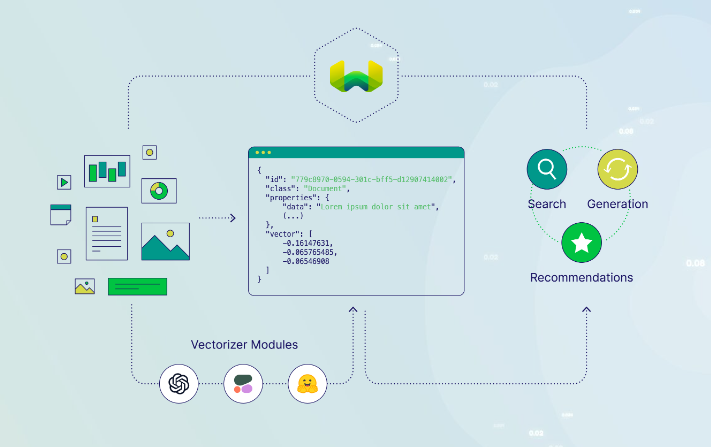 AI
AI
 AI
AI
 AI
AI
AI-native vector database startup Weaviate B.V. is expanding into artificial intelligence development with the launch of a new “workbench” that consists of various cloud-based applications and tools for developers, along with a flexible, tiered storage offering.
The company said it was inspired to launch its own suite of tools by the vibrant community of developers that has come to rely on its open-source database to store billions of essential “vectors” for AI models. The new tools are meant to help developers accelerate AI-native application development, while its ready-made apps are like white-label versions of common AI use cases.
Weaviate, which last hit the headlines in April 2023 when it raised $50 million in funding, is the creator of an open-source vector database that’s geared to AI development. Its database caters to the demand for unstructured data, which is essential for powering generative AI models such as ChatGPT.
It stores this unstructured information as vectors, which are mathematical structures that represent everything from documents to purchase logs, to images and audio files. By storing the data as vectors, it’s much easier for AI models to understand and process it.
The startup says its database groups the records it stores based on their similarity. If the database receives two sets of academic papers that discuss processors and memory chips, respectively, it can organize them by topic into two separate collections.
According to the startup, its database groups records by similarity using an approach that draws on the field of geometry. Each file is represented as a point in space, with those representing similar files placed close to one another, and dissimilar data points placed farther apart.
This capability is essential for many AI applications. For instance, an AI-based cybersecurity tools can check if a new file is malicious by comparing it to known malware types. It can also aid in search and data classification tasks.
Weaviate says its new AI workbench, available now within the Weaviate Cloud Console, includes a Query tool for querying data in its cloud using a GraphQL interface, and a Collections tool for creating and managing collections without needing to write any code. There’s also a new Explorer tool, which developers can use to search and validate object data through a graphical user interface.
The first application is the Weaviate Recommender app, which developers can use to rapidly build and scale customized recommendation systems. It provides configurable endpoints for item-to-item, item-to-user and user-to-user recommendation scenarios, with support for image, text, audio and other multimodal data types, the company said.
Alongside its workbench, Weaviate has created a dedicated “labs” division that’s focused on testing “daring ideas” and transforming them into new products to be offered alongside its flagship vector database. The Weaviate Labs team is currently developing a new application that will enable developers to quickly deploy production-ready “generative feedback loops” that can help to boost the intelligence of AI agents.
Weaviate’s new tiered storage offering might be even more interesting for AI developers, enabling applications that leverage its database to be optimized for speed, cost and performance, the startup says. Using the service, developers can choose between “hot” storage for high performance read/write data access in real time, “warm” for more balanced access of data that’s used less frequently, and “cold,” which provides the most cost-effective long-term storage of data that’s accessed infrequently.
The startup believes this flexibility is important to developers. For instance, a low-latency AI app that’s closely tied to revenue, such as a e-commerce search and recommendation engine, can tap Weviate’s hot storage tier to ensure the best performance, while applications with higher latency tolerance, such as a chatbot, can leverage cold storage to scale more efficiently.
The startup claims it’s one of the first dedicated vector databases to offer this kind of flexibility. It says most of its rivals’ offerings treat all data as “hot,” providing rapid access at high prices. Weviate believes developers need greater flexibility, so they can scale their AI applications based on how often they’re being used, and how much revenue they generate.
Co-founder and Chief Executive Bob van Luijt said the AI-native stack needs to evolve so that organizations can build AI applications more rapidly and deploy them at lower costs.
“Listening to our community, it’s clear that to take the next step, developers need an AI-native framework with flexible storage tiers, modular GUI tools to interact with their data, and a pipeline of new concepts to spark their creativity,” Van Luijt said.
Support our mission to keep content open and free by engaging with theCUBE community. Join theCUBE’s Alumni Trust Network, where technology leaders connect, share intelligence and create opportunities.
Founded by tech visionaries John Furrier and Dave Vellante, SiliconANGLE Media has built a dynamic ecosystem of industry-leading digital media brands that reach 15+ million elite tech professionals. Our new proprietary theCUBE AI Video Cloud is breaking ground in audience interaction, leveraging theCUBEai.com neural network to help technology companies make data-driven decisions and stay at the forefront of industry conversations.